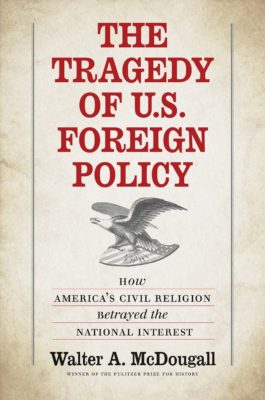A nation must think before it acts.
Epigraphs and Introduction
The Tragedy of U.S. Foreign Policy:
How America’s Civil Religion Betrayed the National Interest
The original draft of this book contained 172 pages of endnotes, which had to be shed in the name of economy. Thanks to the Internet, readers can access them here. Unfortunately, of course, the author had to substitute page and paragraph numbers for the original superscripts in the text, but in most cases it should be clear which sentences in a given paragraph match up with which sources.
Paragraphs appearing in their entirety on a single page are identified by the page number (e.g., p. 122). Paragraphs divided between two pages are identified by those pages (e.g., pp. 92-93). Paragraphs that share a page with another complete paragraph are identified by the page number and paragraph number (e.g., p. 103, ¶ 1).
| Next: Chapter 1 |
Epigraphs:
The first quote is from The Works of the Honourable James Wilson, 3 vols. (Philadelphia: Bronson and Chauncey, 1804) I: 160. The Scottish born Wilson was the first law professor at the College of Philadelphia (the future University of Pennsylvania), an influential delegate to the Constitutional Convention, and an original Justice of the Supreme Court. He is one of my favorite Founding Fathers. I thank David R. Gillie for drawing my attention to this passage.
The second quote is from George F. Kennan, American Diplomacy (Chicago: University of Chicago, 1951), p.3. It speaks for itself and speaks volumes.
The third quote is from Charles Peguy, Notre Jeunesse (Paris: Éditions Gallimard, 1993 <1910>), p. 115. The first sentence is almost always cited alone, but the follow on sentence richly elaborates Peguy’s ironic observation.
Introduction: 9/11 in Parallax Vision:
1: The PowerMux (or multiplexer) allows multiple channels of information to be “chopped up” at their sources according to distinct spurts of time or frequency, the transmitted in one signal stream and separated out at their destinations. When operating at the ultra-high frequency Giga-Hertz range, the devices can transmit hundreds of conversations or data streams simultaneously via communications satellite links, terrestrial microwave radio links, or fiber optic circuits. Needless to say, multiplexers are integral to the battle-management networks made possible by the 1990s cybernetic “Revolution in Military Affairs.”
1-2: See https://www.coverbrowser.com/bushwarriors for images of both Der Spiegel covers.
2, ¶1: Auth’s cartoon appears at https://richardbrenneman.wordpress.com/category/cartoons/page/37
2, ¶2: Walter Russell Mead, “A New Look at U.S. Foreign Policy,” Claremont Review of Books 10:1 (Winter 2009-10): 36-38.
2, ¶2: For instance, Walter Russell Mead, Special Providence: American Foreign Policy and How It Changed the World (New York: Knopf, 2001); Richard M. Gamble, The War for Righteousness: Progressive Christianity, the Great War, and the Rise of the Messianic Nation (Wilmington, Del.: ISI Books, 2003); Robert Jewett and John Shelton Lawrence, Captain America and the Crusade Against Evil (Grand Rapids: Eerdmans, 2003); Orrin Schwab, Redeemer Nation: America and the World in the Technocratic Age, 1914 to the Present (Salt Lake City: American Universities and Colleges Press, 2004); David Traxell, Crusader Nation: The United States in Peace and the Great War, 1898-1920 (New York: Knopf, 2006);David S. Foglesong, The American Mission and the “Evil Empire”: The Crusade for a “Free Russia” since 1881 (New York: Cambridge University, 2007). An Egyptian edition of Promised Land was translated by Reda Helal (Nasr City Cairo: Dar El Sherouk, 2000).
3-4: Walter A. McDougall, Promised Land, Crusader State: The American Encounter with the World since 1776 (Boston: Houghton Mifflin, 1997), pp. 4-5.
4, ¶1: Irving Kristol, “In Search of Our National Interest,” Wall Street Journal (June 7, 1990); Jeane Kirkpatrick, “A Normal Country in a Normal Time,” The National Interest (Fall 1990).
4, ¶2: McDougall, Promised Land, Crusader State, p. 5.
5: These seemingly paradoxical questions are the subject of Michael C. Desch, “America’s Liberal Illiberalism: The Ideological Origins of Overreaction in U.S. Foreign Policy,” International Security 32:3 (Winter 2007/08): 7-43.
pp 5-6: In “Revisions in Need of Revising: What Went Wrong in the Iraq War,” a December 2005 post-mortem conducted for the Department of the Army, political scientists David C. Hendrickson and Robert W. Tucker questioned a strategic culture that made “nation-building” missions imperative (p. 27): “Rather than ‘do it better next time,’ the contrary lesson would be on the order of ‘don’t do it at all.’” See the spooky book by Carolyn Marvin and David W. Ingle, Blood Sacrifice and the Nation: Myth, Ritual and the American Flag (New York: Cambridge University, 1999).
| Next: Chapter 1 |




